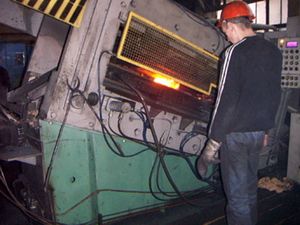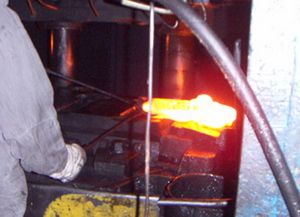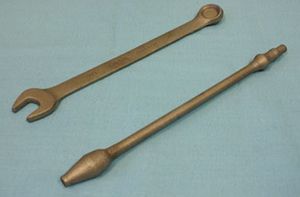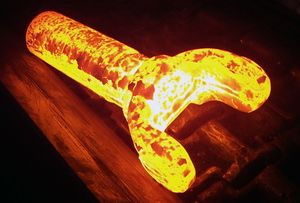
1

2
Main Sector of relevance\IRC classification 8. Industrial Manufacturing, Material and Transport Technologies
8.22 Plastic shaping combined technology based on transverse wedge-type rolling and stamping procedures
Developers’ contact information
State Scientific Institution “The Physical-Engineering Institute of the National Academy of Sciences of Belarus”, Metal Science Department, Laboratory
for Microcrystalline and Amorphous Materials
10 Academician V.F.Kuprevich Street, Minsk BY-220141
Summary
Combining technologies of transverse wedge-type rolling and stamping provides an opportunity for development of almost non-waste processes with metal recovery making up 0.98. Transverse wedge-type rolling is used for intermediate profile stocks production and further close tolerance forging or any other plastic shaping processes.
Description
The purpose of the development is to ensure maximum material and
energy resources saving and high-quality output for die-forging production. The
combination of the transverse wedge-type rolling and stamping technologies
gives a practically non waste process. Transverse wedge-type rolling is used
for intermediate profile stocks production and further close tolerance forging
or any other plastic shaping processes. The developed process of screw spikes
production can serve an example of its successful application. The technology
includes zone heating of 24 mm stocks and screw head mechanical pressing, and
then a second cycle of zone heating is carried out followed by 24mm thread
transverse wedge-type rolling. The resulting products correspond to GOST 809-71
requirements.
A range of technologies have been developed to ensure resource saving part
production, including pre-shaped stock transverse wedge-type rolling and its
further close-die stamping in the same heating cycle. For instance, nut wrench
manufacturing technology consists of two stages: automatic pre-shaped stock
manufacturing from bar stock by means of transverse wedge-type rolling and
hammer or press stamping.

“BELKARD”, OJSC (Grodno propeller-shaft plant) (Belarus) has introduced in
its production process the newly developed transverse wedge-type rolling to
manufacture profile stocks for further stamping of propeller-shaft yokes. Over
the period from December, 2006 till November, 2007 “BELKARD”, OJSC stamped
46 675 forgings. The total sum of saving for the period amounted to 56000
USD.

1 |

2 |

Propeller-shaft yoke forging
Technology type
Technical advantages and economic benefits
Competitive advantages:
Technology differentiation and uniqueness
Payoff period is less than one year.
Context in which technology was identified
Hannover industrial fair, Moscow International Salon of Innovations and Investments, “Belpromexpo”, “Vietnam EXPO”, International Indian trade fair.
Technological keywords
Plastic deformation, rolling, stamping.
Development Stage
Intellectual property rights
Range of applications
It is applied in manufacturing of parts for motor-vehicle construction, machine-tool building, instrument-making industry, agricultural machine-building, tractor and aircraft, motor and cycle, mining and nuclear power industries. It allows processing of almost every construction steel as well as brass, titanium, zirconium and nickel.
Classifier Used at the EU Innovation Relay Centres
Preferable Regions
Practical experience
State Scientific Institution “Physics and Technology Institute of the Academy of Sciences of Belarus” carries out fundamental research on plasticity and endurance theory, constitutional and structural changes in metals and alloys, impulse and electrophysical metal treatment methods, develops new production and treatment processes for engineering materials and products. Theoretical foundation of the transverse wedge-type rolling method and design of proper tools and equipment is the main activity of the Department for process-oriented deformability. The institute created a school of transverse wedge-type rolling specialists which is recognized as leading all over the world. Innovative cooperation activities engage universities and research institutes in Russia, the USA, China, Poland, Germany, Turkey, Brazil, India, South Korea, Vietnam, Rumania, and the Czech Republic.
Environmental impact
Minimal.
Type of collaboration sought
Terms and restrictions
—
Available technical assistance